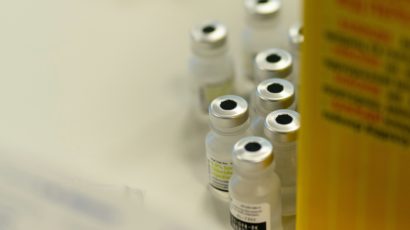Watch out for ‘duck fleas’!
‘Duck fleas’ (or ‘puces de canard’ in French) are actually a relatively common problem that can result from swimming in Lac Leman. They can lead to an itchy skin rash known as ‘swimmers itch’ or ‘swimmers dermatitis’. Swimmer’s itch is not caused by fleas exactly but by a worm-like parasite whose usual host is the ducks that live in the lake. Whilst you are swimming in the lake, immature forms of the parasite larvae can penetrate ‘mistakenly’ through your skin rather than finding their usual host, a duck. So, humans are infected ‘accidentally’. The parasite actually dies when it enters your skin. However, your body can develop an allergic reaction to the parasite and it is this that causes the rash.
What are the symptoms?
On your first exposure to the parasite, you may not have any reaction or develop any symptoms. However, you can still become ‘sensitized’ to the parasite and the next time that you are exposed to it, symptoms can develop.
If symptoms do develop, at first you may notice tiny red spots at the points at which the larvae have penetrated your skin. The spots can be tingly or itchy. After a few hours, the spots tend to become bigger and more ‘pimple-like’ or bumpy. Intense itching is usual at this stage. Occasionally, blistering can occur over the next few days. The rash will develop on areas of the skin exposed to the water. So, skin under a swimsuit can be protected and therefore spared from the rash.
If you’ve developed swimmer’s itch before, you may develop a more severe rash the next time you are exposed to the parasite.
What treatment do I need if I get ‘duck fleas’?
The rash will eventually go away of its own accord but it may take between 10-20 days to disappear completely.
If you have just a few itchy patches, you may not need any treatment. However, most of the time, itching is quite intense. It’s important to control itching because scratching can damage your skin further and sometimes lead to a secondary bacterial infection which may need treatment with antibiotics.
Calamine lotion or an antihistamine may help to treat itching. Antihistamine liquid is available for children. However, do take care when using antihistamines as some can make you drowsy and so you should not drive or operate machinery whilst taking them. Always read the packet leaflet carefully and get advice from your local pharmacist to make sure that they are safe for you to use. For example, antihistamines may not be safe in certain medical conditions or if you are pregnant or breastfeeding.
A mild corticosteroid cream such as 1% hydrocortisone can also sometimes be helpful. Again, get advice from a pharmacist before using this. Rarely, in very severe cases, steroids taken by mouth may be needed.
How can I avoid ‘duck fleas’?
Some useful advice as suggested by CIPEL (International Commission for the protection of Leman Waters):
- Avoid swimming close to the plants and vegetation at the water’s edge as these can be a particular habitat for the parasite.
- Take a shower as soon as you get out of the water. Most of the beaches around the lake have showers available on the lakeside.
- Dry yourself off with a towel after your shower. The brisk rubbing motion with a towel can help to stop the larvae from penetrating your skin.
HealthFirst organises many different first aid courses including ones covering first aid in the mountains.





